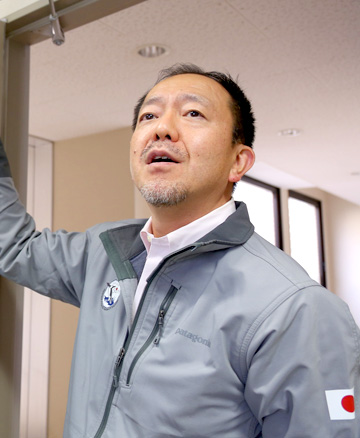
'International law is so romantic'. Heeding these words from his mentor during his days as a university student, Professor SHIBATA Akiho (Graduate School of International Cooperation Studies) has travelled the path of international law researcher.
He has supported the Japanese government in treaty negotiations as a delegate, establishing an "on-the-ground" research style. From the end of 2016, he went on a 4-month expedition to Antarctica to understand how the Antarctic Treaty System has contributed towards ensuring that Antarctica remains a place for peace and science. Professor Shibata is collaborating with natural scientists to investigate how international law can function to bring about stability in the world.
You are engaged in 'Field-based international law'. How and why did you start attending diplomatic negotiations while working as a university professor?
Professor Shibata: When I was an Associate Professor in Okayama University's Faculty of Law, my friend in the Ministry of Foreign Affairs (MOFA) asked me whether I was interested in contributing my knowledge of international law to environmental diplomacy. This led to my working as an advisor at the Permanent Mission of Japan to the International Organizations in Geneva for 2 years from 2001. Even though I was not specializing in international environmental law at the time, I joined the delegation hoping to be able to observe the treaty negotiations "on the ground".
Lawyers are trained to interpret statutes and treaties, however, more often than not, it is difficult to understand them properly without knowing the negotiations and the background behind a particular choice of terms.
By attending the treaty negotiations, I was able to gain first-hand information on the conflict of interests between nations, as well as their diplomatic techniques for reaching compromises, which are not recorded in public records. In addition, International law (treaties) is implemented in a world with real interests and conflicts of nations. Understanding those realities and their importance for the study of international law was the starting point for my field-based research style.
For about ten years I have attended these negotiations as a member of the Japanese delegation. The negotiation on the Antarctic Treaty Secretariat from 2002 to 2003, on a new treaty on Antarctic environmental liability regime from 2002 to 2005 (both within the context of Antarctic Treaty Consultative Meetings (ATCM)), and on a new treaty on environmental liability arising from genetically modified organisms (GMOs) under the Cartagena Protocol on Biosafety (MOP), from 2006 to 2010, were some of the memorable moments of my negotiation experiences.
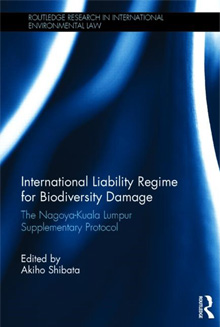
Isn't it rare to find an academic with this kind of research style?
It was unusual 20 years ago to have an academic attending these treaty negotiations as a full member of a government delegation. Attending those meetings while teaching and researching did take time and effort. It was difficult to balance my roles as a professor and as a diplomat. Today, there are more researchers like me attending diplomatic negotiations, and I think the necessity of substantive engagement from academia in treaty negotiations has increasingly been recognized.
These "on-the-ground" experiences have led to the successful publication of academic papers and books. One such achievement is an edited book published in 2014 on the 'Nagoya-Kuala Lumpur Supplementary Protocol' (adopted in 2010, entered into force 2018) which addresses the environmental liability arising from GMOs. This book articulates the complex negotiation history, as well as the academic significance of this new treaty in the field of environmental liability.
I also published a paper entitled "Japan and the 100 Years of Antarctic Legal Order" in 2015 in the 'Yearbook of Polar Law Vol. 7'. This was based on my experiences attending the Antarctic Treaty Consultative Meetings (ATCMs) since 2002.
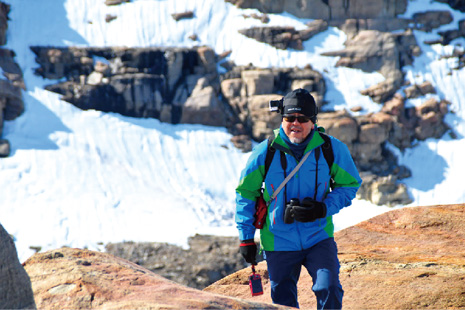
|
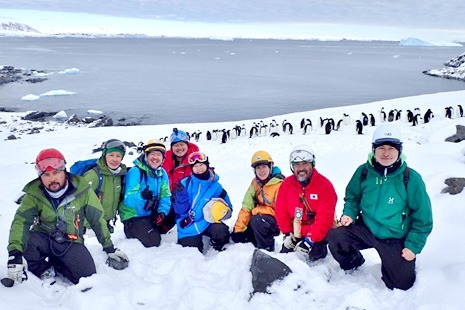
|
| Professor Shibata conducting research in Skallevikshalsen, Antarctica. | With fellow members of the Antarctic expedition (third from left). |
You don't just attend treaty negotiations. Why did you decide to go to the Antarctic in person?
I was able to observe the complex national interests behind the Antarctic Treaty and its Environmental Protocol by attending the ATCMs from 2002 to 2008 as both a member and the head of the Japanese delegation. For example, the protection of the Antarctic environment in light of increasing human activities like tourism is an important agenda of the meetings, but, at the same time, the Treaty promotes scientific investigations and collaboration. My fellow scientists attending the ATCMs often admonished me: "Until you actually come to Antarctica, you will not be able to comprehend the realities and difficulties in conducting scientific activities there while trying to protect the environment". Then, I realized that, in order to comprehend the "on-the-ground" realities of scientific activities, their potential environmental impacts, and the Antarctic ecosystem that the Treaty System is trying to protect, I needed to see and feel Antarctica with my own eyes and senses.
I suppose that it wasn't easy to go on an expedition to Antarctica as an international law researcher?
Japan's Antarctic Research Expedition Plan is formulated every 6 years based on the cabinet's decision. At the time, there was nothing in the Plan that would enable a social scientist to go to Antarctica for research.
Around ten years ago, there was a worldwide trend that large scientific projects must justify their significance not only in scientific terms but also in relation to their societal benefits and contribution to good policy and law-making. As a member of the government committee that formulated the draft of the 8th Antarctic Research Expedition Plan (2016-2021), I claimed that 'The inclusion of social science and humanity studies is necessary in order for the Antarctic Research Expedition to be relevant to societal and policy needs'. The committee decided to add social science and humanity studies to the plan. I applied with a research project entitled: "Antarctica Treaty System on the Ground", which was accepted.
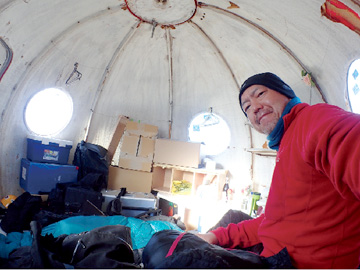
You were able to go to the Antarctic for 4 months from November 2016 to March the following year.
In many ways it was an eye-opening experience. First of all, I deeply felt the attraction of witnessing a landscape untouched by humans when I saw the Antarctic in person. I came to understand that it is not easy to quash the dreams of those who want to go to Antarctica.
Today, more than 50,000 tourists visit every year, and I could appreciate the difficulty of finding a balance between protecting the wilderness value of Antarctica and people's desire to witness it firsthand.
Based on the 'Protocol on Environmental Protection to the Antarctic Treaty', entering an 'Antarctic Special Protected Area (ASPA)' is prohibited without prior permission from the authorities. Near Syowa Station, there is Yukidori Valley (ASPA number 141), which is monitored by the Japanese government. It is a nesting area for snow petrels, which are called Yukidori in Japanese. Their waste and carcasses provide nutrients for the algae and lichen that live near the stream that flows through the valley. The green moss that cannot be seen in other rocky regions of Antarctica looks miraculously bright. Scientists who have studied this area describe it as a 'rich ecosystem'. To protect this valuable natural environment, entry by vehicle and the landing of helicopters are prohibited. Scientists have to walk there, lugging their dinghies and research instruments across the steep rocks stretching across Yukidori Valley.
The area where Japan's Syowa Station is located is difficult to access. It is outside the current tourist destinations, yet tourists will visit there sooner or later. The Antarctic's wilderness value should be equally accessible to people all over the world, not exclusively accessed by some groups of scientists. I would like to contribute towards international rule-making so that more people can appreciate the values of Antarctica, including its wilderness as well as a place for science, and these values can be passed down to future generations.
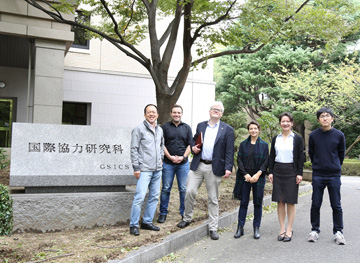
As the Director of the Polar Cooperation Research Centre at Kobe University, you are also researching Arctic law.
The Polar Regions are affected more significantly by environmental changes, particularly by climate change, and, thus, they are important areas for scientific investigations. In Antarctica, research has been conducted for more than 150 years, thanks in part to the Antarctic Treaty of 1959. The Arctic, however, is clearly divided into countries' territories, so scientists were unable to conduct research there at the height of the Cold War. Even though the Arctic is an important area for research, not much scientific knowledge had been accumulated.
After the Cold War, it was possible to carry out scientific activities from 1990 onwards. We have learned that global warming has had a significant impact on the Arctic in the last ten years or so, and it has been predicted that sea ice will disappear during summer. It was originally thought that this would be around 2050 but it is now considered that this will happen around 2030. As sea ice disappears, human activity in the area will become more and more prevalent. Although there is no equivalent treaty in the Arctic, there is an academic potential to learn from the Antarctic Treaty System's legal and policy responses in order to protect the environment and to regulate increasing human activities in the Polar Regions. I think that my international law research can be utilized in this context.
What kind of role do you think researchers can play in a world where nations' interests clash in international law negotiations?
In my opinion, the stability of the international community as maintained by law, rather than by force, is better. Therefore, it is extremely important to develop international law that reflects the consensus of countries and is thus effective and long-lasting.
In the Polar Regions, for example, there would be the right momentum to establish international norms in order to tackle new problems, and the interested countries could share a common aim in negotiating a new treaty. In such cases, I would like to contribute towards establishing effective international norms and treaties to resolve these problems that also reflect Japan's national interests.
What research area will you focus on next?
2019 marked the 60th anniversary of the Antarctic Treaty's conclusion, and in 2021 it will be 60 years since its entering into force. With emerging nations such as China becoming stronger, there have been debates as to whether the Antarctic Treaty will continue to be effective in regulating this area in a changing world. I think the time has come to reconfirm the importance of international law. For this reason, I would like to complete the international collaborative research project that I am working on.
At the Polar Cooperation Research Centre, I would like to foster collaborations between natural scientists and social scientists. Currently, we are setting up an Arctic research project with researchers from the Japan Agency for Marine-Earth Science and Technology to create new knowledge through a collaboration between maritime science and international law. I would like to academically clarify how scientific activities can be given policy significance under the concept of 'Policy Relevant Science'.
For researchers, it is vital that they publicize their latest research in books and papers. In the field of international law, I think that it is necessary to communicate these results in English.
There is no shortage of GSICS graduates who become international civil servants. Fieldwork experience in international treaties is an invaluable part of graduate students' education too.
It would be fairly easy to take graduate students to treaty negotiations as I have many friends who are treaty secretariat staff or members of individual country delegations. It would enable the students to observe what diplomats do up close. International civil servants in the Treaty Secretariat also play important roles. Secretariat staff who are old acquaintances of mine could mentor the graduate students, enabling them to learn about their work, which involves setting up negotiations and producing documents to ensure that treaty negotiations proceed. The students could get a feel for what the work of international civil servants entails, how it relates to nations and what is neutrality. This will help them to build their careers.
There are many graduates working as international civil servants. The other day, a former student who works for The UN Refugee Agency (UNHCR) visited me and joyfully informed me: "I have been posted to Lebanon!"






